From the WSJ:
Sounds like they need a new set of guessers.A sales-tax increase pushed Japan's economy into a recession in the third quarter, setting the stage for Prime Minister Shinzo Abe to postpone a second increase in the tax.
Japan's real GDP shrank 1.6% on an annualized basis as firms cut inventories and held back on capital investment. None of the 18 economists surveyed by The Wall Street Journal had forecast a contraction; the median forecast was for a 2.25% expansion.


